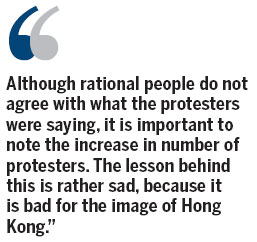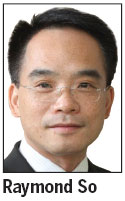HK's discriminatory attitudes to mainland tourists worrying
Updated: 2014-02-20 07:38
By Raymond So(HK Edition)
|
|||||||||
Last Sunday was a day of humiliation for Hong Kong. A group of people protested against mainland tourists in Tsim Sha Tsui. They shouted out offensive words like "locusts" and expressed their contempt for mainland tourists. Some people even resorted to using very bad language. This kind of behavior needs to be condemned, as it is discriminatory. For an international city, such conduct is simply uncivilized.
It is true that the inflow of mainland tourists has brought problems to Hong Kong. However, one needs to face the fact that this is inevitable. Tourists all over the world bring problems to host countries, and academics have studied the impact of tourism for decades. In numerous studies, it is agreed that tourism will have negative impacts on local people. Tourists not only will affect the quiet and simple life of locals, but will also cause changes in the economic and social environment of these countries.
When we look at how Hong Kong people behave on vacation, we have to admit that we also annoy people in other countries. An example close to home illustrates this point well. Several years ago, some Macao people complained about tourists from Hong Kong, who said Hong Kong tourists drove up prices and made waiting times at restaurants longer. This sounds familiar to what Hong Kong people say about mainland tourists. In short, we all need to admit there are downsides to tourism.

Even though there are negative impacts of inbound tourism, countries all over the world generally welcome tourists. The reason for this is that tourism can generate a lot of economic value - especially jobs at the lower end. When we look back at Hong Kong 10 years ago, the inflow of mainland tourists helped to restart the economy. Saying tourists bring no advantages to Hong Kong is simply untrue.
The central issue in Sunday's incident is the irrational condemnation of mainland tourists. This originates from a poor handling of tourism by the Hong Kong government. Academics and professionals in the tourism industry have warned the government about the lack of support infrastructure for tourism. We simply cannot wait for the market to deal with this difficult situation. Clearly the government needs to take a more proactive role.
For example, it is well known that some common tourist spots are over-crowded, causing discontent among people living in these areas. Professionals in the industry have suggested more places should be opened up for tourists to ease the problem of urban density. But so far not much has been done about this. When such a problem is not resolved, then people only see the downside of tourism. And when radical voices look for someone to blame, mainland tourists are the obvious scapegoat.

If we examine the incident more closely, it is a natural extension of previous conflicts. In the past, there were similar incidents, but on a smaller scale. About a year ago, there was an incident with someone on the Internet trying to organize protests against mainland tourists. However, the number of people involved was just handful. As a result there was not much media attention. This time, the number increased sharply. Reports say that over 100 people participated. This is worrying. I am not saying that anti-mainland tourist sentiment will become the dominant view in Hong Kong. The real danger is that radical groups are now enjoying larger membership. If such views are not contained now, then radical views may become radical actions. When this occurs, it is simply too late. Such concerns are not without ground. When I read the Internet postings, there were suggestions that people bring insecticide to spray over the "locusts". If this had really happened, the situation would have become too chaotic to restore order.
Although rational people do not agree with what the protesters were saying, it is important to note the increase in number of protesters. The lesson behind this is rather sad, because it is bad for the image of Hong Kong. Some of my friends who live in the mainland are now asking me why Hong Kong society has become like this. Though it is not easy to resolve the problem, we must not let it get any worse.
The author is dean of the School of Business at Hang Seng Management College.
(HK Edition 02/20/2014 page1)